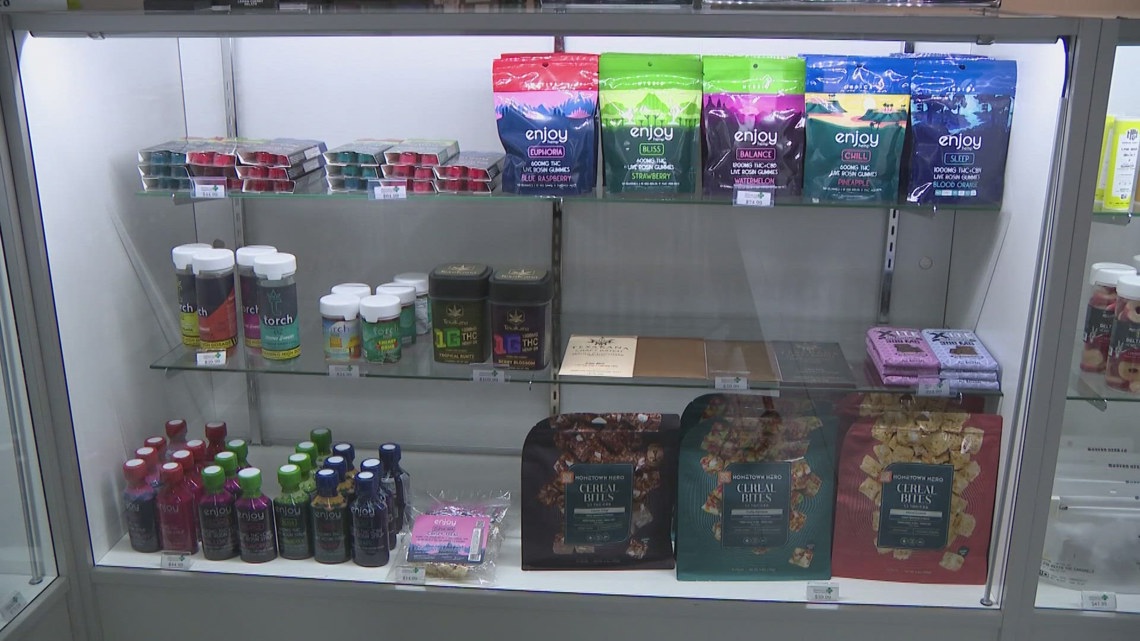
Law enforcement agencies executed search warrants at seven vape and smoke shops across Temple and Belton, seizing products they say were mislabeled as legal hemp.
TEMPLE, Texas — What started as an ordinary Friday morning turned into chaos for seven vape shop owners across Central Texas as a massive law enforcement operation swept through their businesses, seizing products police say were illegally mislabeled as legal hemp.
The coordinated raids, involving 65 officers from six different agencies, represent the largest crackdown on the region’s hemp industry since the products became legal under federal law in 2018.
“Their livelihood today was loaded up in a van and taken away,” said Elizabeth Park, whose family-owned shop was among those targeted.
The investigation began quietly in January when Temple police received complaints from citizens and fellow officers about suspicious products being sold at local vape shops. What followed was a five-month undercover operation that would ultimately involve the FBI, multiple police departments, and state crime laboratories.
Officers posed as customers, purchasing products labeled as legal hemp from stores across Temple and Belton. Each purchase was then sent to state-certified labs for testing, and that’s where the problems began.
Products advertised as containing legal levels of THC—the psychoactive compound in marijuana—came back positive for concentrations well above the 0.3% federal limit that separates legal hemp from illegal marijuana.
At exactly 10:30 AM on Friday, officers hit seven locations simultaneously:
Temple locations:
- 100 block of S 25th Street
- 400 block of N 3rd Street
- 4300 block of S 31st Street
- 6500 block of W Adams Avenue
- 5700 block of W Adams Avenue
- 2800 block of W Adams Avenue
Belton location:
- 2600 block of N Main Street
The operation involved the Temple Police Special Investigations Unit, Criminal Investigations Division, Crime Scene Investigators, Patrol units, Training personnel, and the SWAT Team, as well as officers from the Belton Police, FBI, Waco Police, Killeen Police, and Bell County Sheriff’s Office.
Elizabeth Park watched officers load boxes of inventory from her family’s shop into police vans. The business, she says, was started in 2019 to help her father manage chronic pain from neuropathy and diabetes.
“These are perfectly legal products,” Park insisted. “All the laboratory test paperwork is right inside the building that shows that it has the right percentages of 0.03% of THC, which is within the legal parameters set up by our state.”
Park believes the raids are politically motivated, connected to pending state legislation that could further restrict hemp products. She calls the current situation “sad” and says small business owners are being made “an example of.”
“I think that they’re being targeted,” she said. “I think it’s a direct result of the SB 3 bill that they’re trying to pass.”
At the heart of this dispute lies a fundamental disagreement about testing accuracy. Park argues the methods used by police are “flawed” and create too much “gray area” for business owners to navigate safely.
But police counter that their testing was thorough and conducted at multiple state-certified laboratories, including the Department of Public Safety Crime Lab and NMS Laboratory. They say some products marketed as THC-A actually tested positive for delta-9 THC—the main psychoactive compound in marijuana.
The discrepancy between shop owners’ documentation and police lab results sets up what could be costly legal battles for the affected businesses.
The impact extends far beyond the shop owners themselves. Employees who showed up for work Friday morning were detained during the searches and now face uncertain employment prospects.
Regular customers who relied on these products for pain management are also scrambling for alternatives. Park worries about customers who use hemp products for “physical pain and mental pain” and won’t be able to access them anymore.
“They also are gonna be affected by this,” she said.
The investigation is far from over. Police say they will send certified letters to additional area shops, informing owners that their products have also tested positive for illegal THC levels.
No arrests have been made yet, but the affected business owners now face the expensive prospect of hiring attorneys and expert witnesses to challenge the state lab results in court.
“The burden of proof is going to be on them,” Park said. “They have to obtain lawyers, attorneys, they have to get experts in to come and fight this battle for them.”
